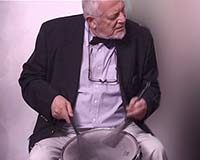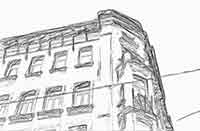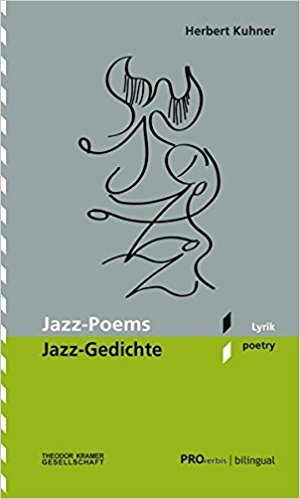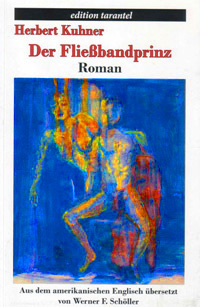-David B. Axelrod at Lhotzky’s Literaturbuffet
David B. Axelrod at
Lhotzky’s Literaturbuffet
The place to visit for the bookworm in Vienna is Lhotzky’s Literaturbuffet, Rotenstrengasse 2 at the corner of Taborstrasse in the 2nd district. Kurt Lhotzky offers a selection of German books, concentrating on political and historical themes, including English books. There are tables whether you can sit, read and order snacks. Kurt is noted for his aromatic coffee and homemade cakes. A different cake is featured every day, and as far as this writer and gourmet is concerned, Kurt’s cakes are among the best in Vienna. Aside from good vittels, book presentations and readings are featured at the bookshop
David was in Vienna from July 14th to 18th in 2008.
German Translations: Herbert Kuhner
David B. Axelrod reads „BRAINS & „TALENTS VS. PERSISTANCE“ video by Fritz Kleibel
Brains and Talent vs. Persistence
If I had half his brains,
I always thought I could
be somebody. And that one –
what talent! But my genius
friend never could fit in –
drinking, drinking until
he shrunk his brain
to ordinary and my
truly-gifted friend
couldn’t focus, bumping
into thing after thing,
leaving me, “Axelrod-
the-poet,” still doing
what I have to,
still hoping I will win.
Verstand und Talent vs. Ausdauer
Wenn ich halb seinen Verstand hätte,
Ich dachte immer, daß ich
jemand seien konnte
Und dieser –
welches Talent! Aber mein genialer
Freund konnte nie dazupassen –
Trinken, trinken bis er
sein Gehirn verkleinerter
zu gewöhnlich und mein
wirklich begabter Freund
konnte nicht fokussieren
und er stieß
in Ding nach Ding,
sodaß „Axelrod der Dichter“, übrig blieb
der immer tut was er tun muß
mit der Hoffnung, daß ich gewinne.
The following poem was inspired by our mutual friend Jozo Boskovski who left us for the Universe in 2008.
Jozo’s poems will appear here presently.
– H.K.
The Man Who Said “Maybe”
He said a European flight
from Macedonia
took more time going
than returning
because the earth turned favorably.
Try to explain the world a single entity – earth
sky and sea –
he’d listen patiently.
Next time he’d mention
travel, his theory
of anti‑gravity
was there again
more steadfast than
Foucault’s pendulum.
If a helicopter
hovered over a city,
would the next city
come along eventually?“
“Maybe.”
Der Mann, der „Maybe“ sagte
Er sagte man braucht mehr Zeit
für ein Flug
von Mazedonien nach Europa
braucht man mehr Zeit
als für den Flug zurück
weil die Erde sich vorteilhaft dreht.
Versuchte ich, die Welt zu erklären
als eine einzelne Entität – Erde
Himmel und Meer – Hörte er mich
geduldig zu.
Aber sobald er
Wieder von Reisen sprach,
war seine Theorie
von Antischwerkraft
wieder da,
standhafter als Foucaults Pendel.
Wenn wir in einem Hubschrauber
über einer Stadt schwebten,
würde die nächste Stadt
schließlich
unter uns erscheinen?
“Maybe!”
David in Mnemosyne. Autumn, 2011, Issue 8
Jews Don’t Get Tattoos
Sounds like a funny rhyme but
the only people with tattoos when
I was growing up all hated me—
tough guys, anti-Semites, wearing
their black marks like signs saying
I’m not one of you. Now body art
is everywhere—wrapped around
the waitress in her cotton summer
dress, a mural of forest creatures.
The young student with a flower
on her breast (and I’m not
supposed to look).
It was serious.
My grandparents‘ friends with
numbers on their wrists—long
numbers so you knew how many
others died. My brother, who
came home with a black spider.
My own daughter with a black
cat on her ankle. I still cringe
when I see a tattoo. Others
see art, a personal statement.
I think it will be the death of me.
Juden werden nicht Tätowiert
Die Tätowierten, als ich aufwuchs
haben mich alle verhaßt –
üble, antisemitische Typen
die ihre dunkeln Zeichen
mit der Botschaft trugen:
Ich bin nicht einer von euch!
Jetzt ist Körperkunst überall:
die Kellnerin in ihrem Baumwollsommerkleid –
eine Gemälde von Waldkreaturen.
Die junge Studentin mit einer Blume
auf ihre Brust (und ich soll nicht
hinschauen).
Es war ernst.
Die Freunde meiner Großeltern mit
Nummern auf ihren Handgelenke – lange
Nummern, so daß man wußte, wie viele
andere starben. Mein Bruder der
mit einer schwarzen Spinne
heimkam.
Meine eigene Tochter mit einer
schwarzen Katze auf ihrem Knöchel.
Mich schaudert’s immer noch
wenn ich eine Tätowierung sehe.
Für andere sind sie Kunst – ein Ausdruck ihre Individualität.
Ich denke, daß sie mein Tod sein werden.
Weapon of Choice
I admire guns
their finality;
the vociferation
of a blade, too long;
the bludgeon‘ s
argument diffuse.
A gun, point
not to be argued.
I admire the bullet
proof that less is
more; not
the perturbation
of poison, nor
vagaries of accidents.
A bullet, end
of story.
But most, I admire
the target;
predestination
a question; the gods
aloof; concentric
circles truth.
Waffe der Wahl
Ich bewundere Waffen —
ihre Endgültigkeit;
das Herausschreien eines Degens, zu lang;
das Argument des Knüppels zu kompliziert.
Ein Gewehr,
keine Diskussion.
Ich bewundere die Kugel —
ein Beweis, dass weniger
mehr ist; weder
die Unruhe
von Gift, noch
die Launen von Zufällen.
Eine Kugel, Ende
der Geschichte.
Aber am meisten bewundere ich
das Ziel;
Vorherbestimmung
eine Frage; die Götter
erhaben; konzentrische
Watching You
I spent till sunrise
watching you, your
restless breaths,
your high-boned face,
your nakedness defined in blue-gray
light of quarter moon.
You sighed and turned
and still I stared,
the thick curled knot
of jet-black hair tied up to bare
a soft, strong neck,
supple shoulders,
the outline of small breasts.
Until you turned again toward me,
eyes flickering in half-surprise.
I spent till sunrise watching you,
protector of your
dreams and sighs.
Dich beobachten
Ich betrachtete dich
bis zum Sonnenaufgang
deinen unruhigen Atem,
deine gemeißelten Züge,
deine Nacktheit
im blau-grauen
Licht des Viertelmonds.
Du seufztest und drehtest dich um
und ich starrte dich immer noch an,
der dicht-kräuselte Knoten
deinem schwarzen Haar
gebunden über
deinem graziösen Nacken,
geschmeidige Schultern,
der Umriss
deiner kleinen Brüsten.
Bis du dich nochmal
zu mir drehtest,
flackernde Augen
in halber Überraschung.
Bis Sonnenaufgang
habe ich dich angesehen,
Beschützer deiner
Träume und Seufzer.
Single Heron
There is a single heron,
tilts in the night waters
a foot poised
an eye for silver to flash
down — a patient fisher
after supper; teaches me
that balance counts
as much as speed, grace
an equal for any force.
From it I learn to swallow
life whole and down the gullet.
Single Heron
There is a single heron,
tilts in the night waters
a foot poised
an eye for silver to flash
down — a patient fisher
after supper; teaches me
that balance counts
as much as speed, grace
an equal for any force.
From it I learn to swallow
life whole and down the gullet.
Ein einzelner Reiher
Ein einzelner Reiher
beugt sich in den Nachtwassern
um schillerndes
Silber von unten,
ein Fuß verharrte
unten — ein geduldiger Fischer
nach dem Abendmahl; lehrt mich
dass das Gleichgewicht
ebenso wie Schnelligkeit,
Anmutigkeit zählt.
Gleichgewicht für jede Kraft.
Davon lerne ich das Leben als ganzes
durch die Speiseröhre hinunterzuschlucken.
More of David
In Munich
(from a New York Times report)
´´
Plasticized corpses are on display in a museum.
“I must be doing something right,” their creator says,
injecting the bodies of volunteers with a solution
that hardens into statues. “200,000 people
have viewed my work in just one week.”
Art critics say it’s art. Theologians argue
if it’s disrespectful. No one mentions
how the murder of 6,000,000 souls
also became an art.
In München
(von einem New York Times Bericht)
Plastifizierte Leichen werden in einem Museum ausgestellt.
„Ich habe sicher das Richtige getan,“ sagt ihr Schöpfer.
Er injizierte die Körper von Freiwilligen mit einer Lösung
das so hart wird daß eine Statue entsteht. “200.000 Besucher
haben meine Arbeit in nur eine Woche besichtigt ”
Kunstkritiker sagen, sie sei Kunst. Theologen sagen
sie sei respektlos. Niemand erwähnt
wie der Mord an 6.000.000 Seelen
auch Kunst wurde.
Faith and Prejudice
Faith begins where reason leaves off.
Thirty-two students are shot dead by
a boy who is angry. „God has taken them
to do his work in heaven,“ one mother
says. Prejudice substitutes for reason.
All so-and-sos are criminals or lazy.
Faith and prejudice go hand in hand.
Because you do not worship
my god, you are not worthy.
All those who do not worship my way
are of no account or should be dead.
Kill the infidel. Kill the Christ killers.
Drive out the non-believers.
Faith is the prettier name for prejudice.
I do this in god’s name. The devil makes
them do that. Nothing can prove that my
religion is the true faith. Nothing you do
therefore is true. If it is built on false
assumptions, it can not by its very
nature, ever be reliable or true.
Glaube und Vorurteile
Glaube beginnt dort, wo Vernunft aufhört.
Nachdem zweiunddreißig Studenten von einen
zornigen Jungendlichen erschossen worden sind,
sagt eine Mutter „Gott hat sie zu sich genommen.“
Vorurteile ersetzen die Vernunft.
Alle Sonderlinge sind entweder Kriminelle oder faul.
Glaube und Vorurteile gehen Hand in Hand.
Weil du nicht betest,
bist du der Gottesgnade unwürdig
Alle diejenigen, die nicht an meinen Gott glauben
sind unwürdig und verdienen den Tod.
Tötet die Ungläubigen! Tötet die Mörder Christi!
Sie verdienen es vertrieben zu werden.
Glaube ist ein schöner Name für Vorurteile.
Alles was ich tue, tue ich in Gottesnamen.
Die Taten der Ungläubigen sind Teufelstaten.
Daß mein Glaube der wahre Glaube ist,
kann ich nicht beweisen.
Wenn du auf eine falsche Grundlage baust,
ist alles weder vertrauenswürdig
noch der Wahrheit entsprechend.
Sophistry
The only god I’ve ever worshipped
is the bell-shaped curve.
Sophistik
Der einzige Gott, den ich je verehrte,
ist die Glockenkurve.
1.
Life is a series
of random events.
Random events
produce a probability curve.
Probability patterns
guide our lives.
2.
What guides our
lives is god.
Probability guides
our lives.
The bell-shaped
curve is god.
3.
A lack of god means
life is random.
Random events
produce a pattern.
A lack of god
creates a god.
1.
Das Leben ist eine Reihe
von zufälligen Ereignissen.
Zufällige Ereignisse
produzieren eine Wahrscheinlichkeitskurve.
Zufällige Muster
dienen als Leitfaden des Lebens.
2.
Was unser Leben steuert
ist Gott.
Zufälligkeit lenkt
unser Leben.
Die glockenförmige
Kurve ist Gott.
3.
Ein Mangel an Gott bedeutet,
daß das Leben zufällig ist.
Zufällige Ereignisse
produzieren ein Muster.
Ein Mangel an Gott
schafft einen Gott.
And here’s a piece by David:
THE ART OF BEING TOO JEWISH
by David B. Axelrod
It was a very good summer for me in 1982. My career was taking off as a poet with a big New and Selected Poems just published and lots of performances. One prominent venue on Long Island, Guild Hall in fashionable East Hampton, scheduled me to perform and it was particularly gratifying as I would have so many friends and even some senior poets and mentors in the audience.
I had already lived on Long Island for a dozen years and the renown poet, David Ignatow, had taken me under his wing. By then, he was in all the anthologies, as often for the poem about chasing a bagel! He’d won awards and grants, but to me he complained, “Never the Pulitzer.” Other senior poets presided in the Hamptons—like Michael Braude, Simon Perchik, Kenneth Koch, Phil Appleman, H. R.Hayes, Amrand Schwerner, Richard Elman, Stanley Moss, Frank O’Hara, Harvey Shapiro. Even John Hall Wheelock elderly as he was, was still actively writing.
Guild Hall was well-attended the night of my solo performance. I don’t call myself a performance poet, but I am known for my repartee between poems—even some jokes and “shtick” that liven up my presentations. I was particularly on the mark—or so I thought—that evening. Certainly, the audience laughed, and as is always the measure, the laughs were “on cue”—with me, not at me!
It ended with some gratifying applause but even before I could make my way off stage I saw a flange of three poets aiming at me at. It was Dave Ignatow, Michael Braude and Si Perchik rushing me from the back of the hall. They were visibly agitated. Reaching me, surrounding me, they said, all but in unison, “How could you do that?”
“What did I do?” I asked, concerned I had crossed some unseen line of political correctness or propriety.
“You said all those Jewish things. You should never do that.” They were clearly horrified.
It had never occurred to me that would be an issue. The book had a little section of poems “For my Family” which even included a series of three poems for Jewish holidays. In the course of the reading I told a story about my Lithuanian Orthodox Jewish grandfather, Louis Axelrod, and even used a Yiddish accent. I read a poem about Hanukkah and my Russian grandfather Philip Kransberg and did a little shuckle that he used to do when he lit the menorah.
“It’s the kiss of death,” the threesome told me. Oh, how upset they were. How concerned I’d sunk myself. “Don’t you understand?” they berated me. You can’t ever get ahead if you are known as a Jewish poet.
Later, Dave Ignatow told me he really believed that folks like Untermeyer, a king maker in his days of his Golden Books Family Treasury of Poetry, and Robert Lowell with his “Brahmins,” were the ones. “I’d have had the Pulitzer if not for being Jewish,” Ignatow said. (Louis Simpson, got one, but he converted!)
Not long after, I picked up Howard Nemerov at the Port Jefferson, Long Island train station and hosted him for a reading at an event I sponsored. At a private dinner with me after, at which he drank more than his share, he was talking freely so I asked him, was it so? Was it so dangerous to be publicly Jewish as a poet. “Oh yes, absolutely,” he said. “Look at me,” he said. “What do they call me? An ‘epigramist’?”
Well, what can I do? I have a cousin who is very assertive about his Jewishness. I’ve told him about anti-Semites I met over the years; folks who wouldn’t rent an apartment to me if they knew I was a Jew, or even let me stay in their motel.
“I’d have taken them by the collar and punched them in the face,” my cousin hollered.
“I told them I was Welsh and got the place I needed to stay,” I confessed. But I’m no self-hating Jew. I may not be at all religious but I grew up glad for my cultural roots and there is one thing I also know. Try as a Jew may, pretend, put on airs, deny… One day just one little “Oy” will creep out and it will all be over!
That’s why I figure I might as well shout it out, even at a fancy East Hampton performance.
*******
David Axelrod was born in 1943 in Beverly, Massachusetts. He resides in Selden, Long Island where he is Suffolk County Poet Laureate (2007-2009). Axelrod has published eighteen volumes of poetry, the newest of which is The Impossibility of Dreams (www.ahadadabooks.com). He is founder/Director of Writers Unlimited Agency, Inc., publisher of Writers Ink Press, and president of 3WS, World Wide Writers Services.
He can be found on the web at www.writersunlimited.org and at http://www.poetrydoctor.org/
– Herbert Kuhner









 Users Today : 245
Users Today : 245 Users Yesterday : 165
Users Yesterday : 165 This Month : 2227
This Month : 2227 This Year : 19160
This Year : 19160 Total Users : 177255
Total Users : 177255 Views Today : 482
Views Today : 482 Total views : 1867717
Total views : 1867717 Who's Online : 8
Who's Online : 8




